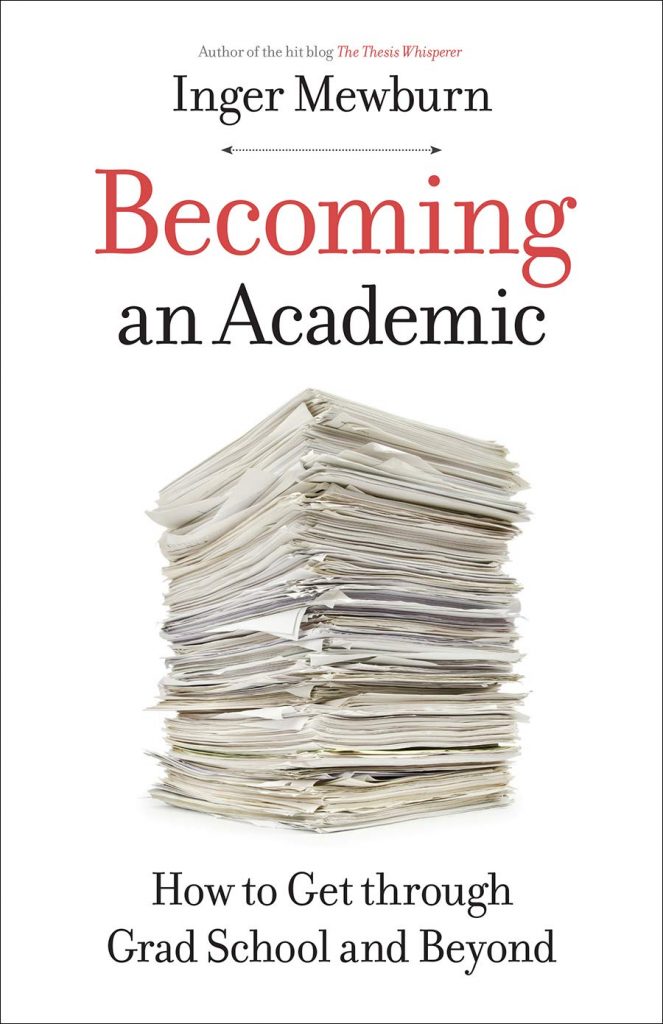If you’ve ever been discouraged by the somewhat challenging prospects of getting an academic job (I mean the real, permanent one) after getting your PhD, you may want to de-stress yourself with Inger Mewburn’s new book Becoming an Academic: How to get through Grad School and Beyond. I’m usually reluctant to read “how to” books because—admittedly, and this is personal—they often remind me of a technical manual that offers advice in the form of a to-do list. I have enough to-do lists already! Mewburn’s book, however, is different and worth reading for the following reasons:
2) It addresses “non-technical” topics, such as what to wear or how to be political in an academic environment
Motivated by her “anger” (“I write best when I am angry”, she says), Mewburn skillfully interweaves her personal stories as a friend and critical thinking as a researcher into a book that can be easily finished in one sit. She also sprinkles her humor and academic research findings here and there, which can satisfy both your personal and “PhD” selves (some of the referenced books are gems!).
1) It’s a delightful escape from your academic reading lists
Besides “technical” topics, such as writing or submitting a promotion application, which are discussed a fair bit in her earlier book that was also listed in a previous ECHER post, Mewburn engages with topics that are only discussed in conversations hidden in the office kitchenette.

3) It empowers you and reassures that you are not alone, either in your PhD journey or afterwards
By sharing experiences of her own and from people whom she knows, Mewburn offers an intimate conversation that can be hard to have with your supervisors or other PhD colleagues, especially when everyone always seems busy. Not all experiences mentioned in the book are glorious, but each individual has somehow chosen to make the most out of them. There are some things in each of their stories that we can learn from.
4) It has convinced me to use Twitter. It may convince you too
Mewburn thinks that technologies (e. g. social media) have been underutilized in the academic community. This speaks straight to my personal experience in refusing to use Twitter for the typical reasons: “I want to focus on my PhD rather than twittering”, “It’s just not for me”, “It’s not how academics should do it”, you name it. But recently I’ve started to realize the benefits of social media platforms. In the end, there will always be use and abuse of technologies, and Mewburn has convinced me that we can choose to benefit from the use of them.
Personal extra: Mewburn is a female Australian academic, some of her experiences are specifically relevant to my situation
Although I’m not Australian, I am a female PhD candidate in Australia. I can relate to, and thus learn from, her journey as I’m undertaking my own in the Australian context which is relatively tough. I know it is tough everywhere but Australia is considered as one of the forerunners in adopting managerialist approaches to HE (Fredman and Doughney 2012) as well as having serious problem of casualization of academic teaching. Even if you are from a different HE system, reading Mewburn’s stories may give you some interesting time to reflect on your own experiences.
In closing the book, I don’t think my chances of getting an academic job will increase after graduation, but I do think my perspective has been broadened. One takeaway from the book that I will constantly remind myself of is “there’s a lot more to getting a PhD degree than writing a dissertation”.
Ai Tam Le (@aitamlp) is a PhD candidate at the Melbourne Graduate School of Education, University of Melbourne. Her research interests revolve around the academic profession and higher education. Her current PhD aims to map doctoral students’ perspectives of what it means to be an academic.
